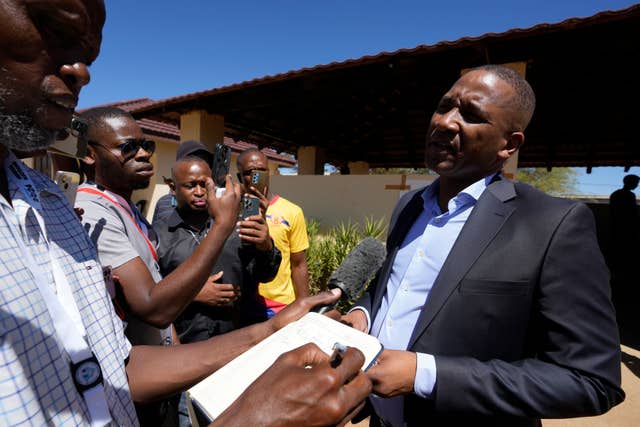
The party of Botswana’s opposition candidate Duma Boko was declared the winner of the general election on Friday over incumbent President Mokgweetsi Masisi in a seismic change that ended the ruling party’s 58 years in power since independence from Britain.
Mr Masisi conceded defeat even before the final results were announced, with his Botswana Democratic Party trailing in fourth place in the parliamentary elections in what appeared to be a humbling rejection by voters and a landslide victory for the main opposition party.
Hours later, Chief Justice Terence Rannowane announced that the opposition Umbrella for Democratic Change party had won a majority of seats in the election, making its candidate, Mr Boko, the next president of the southern African country, which is one of the world’s biggest producers of mined diamonds.

Mr Masisi said he had called Mr Boko to inform him he was conceding defeat.
“I concede the election,” Mr Masisi said in an early-morning press conference two days after the election. “I am proud of our democratic processes. Although I wanted a second term, I will respectfully step aside and participate in a smooth transition process.
“I look forward to attending the coming inauguration and cheering on my successor. He will enjoy my support.”
Mr Masisi’s BDP has dominated politics in Botswana for nearly six decades. The nation of just 2.5 million people will now be governed by another party for the first time in its democratic history.
Botswana First🇧🇼 pic.twitter.com/OxYeO5VV2t
— Duma Boko (@duma_boko) October 31, 2024
“We lost this election massively,” said Mr Masisi, a 63-year-old former high school teacher and Unicef employee. “I have not packed a shoe. I did not expect it,” he added.
Mr Boko is a 54-year-old lawyer and Harvard Law School graduate who also ran in 2014 and 2019.
He did not immediately comment but posted on his official page on X: “Botswana First” with a picture of a UDC campaign poster with the words “Change is Here”.
Botswana has been held up as one of Africa’s most stable democracies with its economy largely relying on diamonds. It is the world’s second-biggest natural diamond producer behind Russia.
The mood for change was evident as a downturn in the global demand for diamonds badly hit Botswana’s economy with unemployment rising to more than 27% this year as the government saw a sharp decrease in revenue from diamonds.
Mr Masisi and his party had faced criticism for not having done enough to diversify the economy.


Comments: Our rules
We want our comments to be a lively and valuable part of our community - a place where readers can debate and engage with the most important local issues. The ability to comment on our stories is a privilege, not a right, however, and that privilege may be withdrawn if it is abused or misused.
Please report any comments that break our rules.
Read the rules here